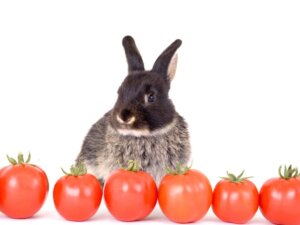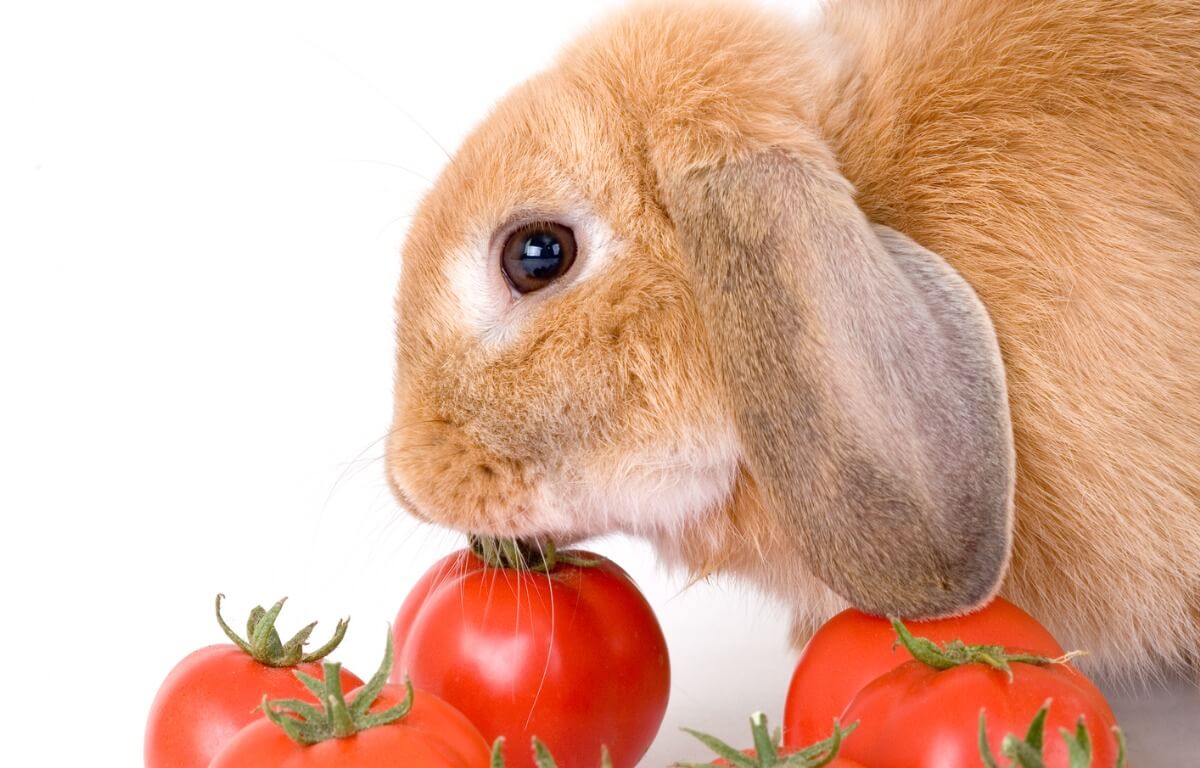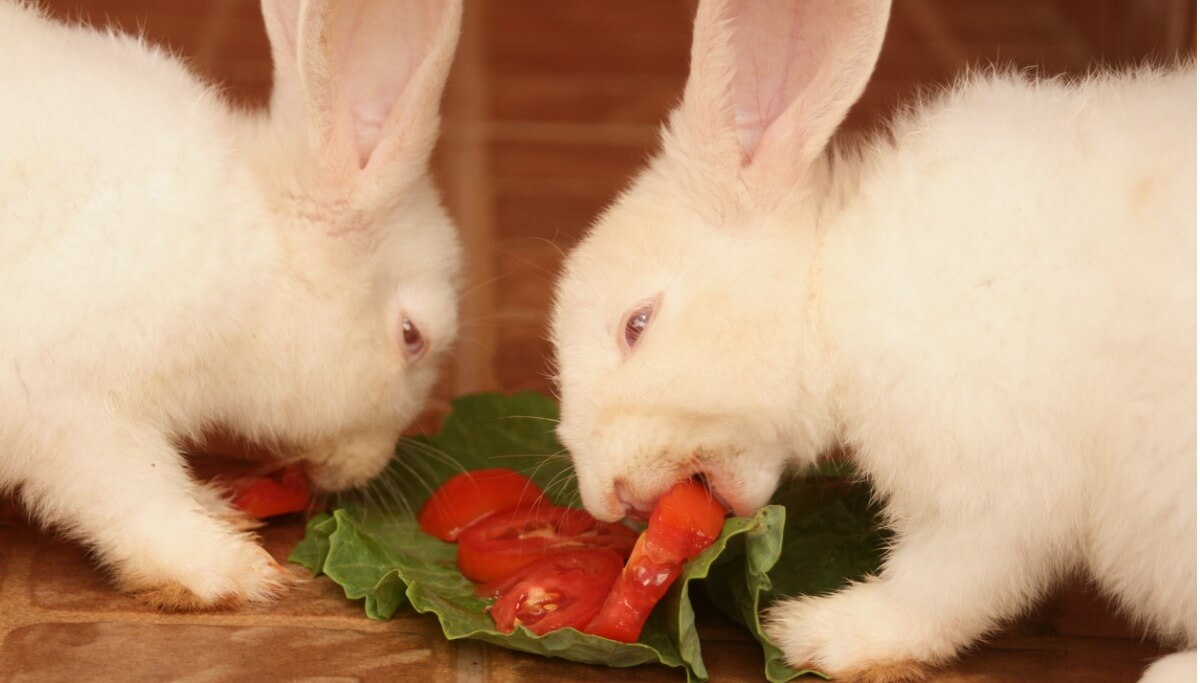Can Rabbits Eat Tomatoes?

Rabbits love a variety of food and getting the right balance in their diet is important for a healthy life. Every owner should find out what food they can and can’t eat and in this article we ask: can rabbits eat tomatoes? And, if so, how often can they eat them?
These little animals enjoy a daily mix of different food, which helps prevent boredom, keeps them busy, and makes their lives more interesting. There are many things rabbits can’t eat, and so knowing them and nourishing your little one with the right things is essential. Can rabbits eat tomatoes? Keep reading and find out!
The ideal diet for all rabbits
Most of a rabbit’s diet should consist of good quality hay or grass, and the amount will depend on its body size. Fresh hay should be available at all times, as it helps maintain your rabbit’s overall health, provides support for wearing down teeth, and provides the fiber necessary for digestive health.
The rest of the diet can consist of fresh leafy greens that you should provide every morning and evening. Hay is extremely versatile and perfect for entertaining your rabbit, since you can also hide other vegetables or fruits in it, as if they were treats. On the other hand, it’s essential to keep fresh water in its cage so that it’s always hydrated.
Can rabbits eat tomatoes?
Tomatoes are classified as fruits from a botanical point of view, although at a culinary level they’re used as vegetables. The fact that they’re conceived as fruits is an important characteristic to take into account for a healthy diet in rabbits, as experts in the subject affirm that they have a high sugar content and even the natural glucose isn’t good for their small digestive system.
In spite of this assessment, we can assure you that giving red or ripe fruit to a rabbit is perfectly fine, as long as you watch how much and how often they have it. However, the tomato plant has several parts that are poisonous to rabbits, so be sure to read on.

What parts of the tomato should be avoided?
Some food can be very dangerous for rabbits. In this case, rabbits can eat tomatoes, but not all the parts of it. You should never feed them the following parts of the plant:
- The leaves
- The stems
- The seeds
- The flowers
- The green fruit
The pulp is known to be safe to eat, but the green stems of tomato plants contain tomatine and solanine, which are poisonous if ingested in high amounts. Because of this, you should avoid giving your bunny the green pieces of the tomato plant as well as green tomatoes.
Another thing to keep in mind when giving tomatoes to your rabbit (or any other fruits and vegetables) is to know if this food contains pesticides and parasites that could harm your rabbit. You should only give fresh, red tomatoes to your rabbit, never green tomatoes or canned, chopped, or overripe tomatoes.
Benefits of tomatoes for rabbits
You should keep in mind that, due to its high sugar content, tomatoes should be consumed in moderation; so says Animal Trust. This food is perfect to offer as a snack or as a reward, but only the fruit.
Although it contains sugar (2.6 grams per 100), rabbits can eat tomatoes and this fruit contains many benefits, reflected in important nutrients that can contribute to the rabbit’s diet. Some of its properties for these animals are the following:
- Vitamin A: This is necessary in rabbits for bone development, vision, reproduction, and their immune system.
- Potassium: This helps prevent a disease called hypokalemia.
- Antioxidants: These are present in tomatoes in a nutrient called lycopene. This is what gives the fruit its red color.
- Fiber: This is an important part of the rabbit’s diet. It’s mainly obtained through hay, but an additional source will do no harm.
- It’s low in fat: Too much fat would affect a rabbit’s health, so a snack like this is a good addition to their main diet.
- It has a high water content: This helps keep your bunny hydrated, as due to their dry, fiber-rich diet, these animals need a lot of water.
How to give tomatoes to a rabbit?
If you have never given tomato to your rabbit and plan to make a change in its diet, all the more reason to introduce the food gradually and moderately to see how it reacts. Your pet may not like it or it may give them an upset stomach, which you’ll be able to tell by analyzing its feces. Once they have got used to it, you can offer it to them in small cubes.
If you’re ever in doubt as to which foods are safe for your pet, the safest thing to do is not to give them at all or to consult a veterinarian.
If your rabbit is very young, you should keep in mind that it has a very delicate digestive system and cannot digest fruits or vegetables of any kind well if it’s very small. Common guidelines suggest that you should wait at least 12 weeks before feeding rabbits fruits or vegetables, and start with small amounts of only one type.

Tomatoes are a good addition to your rabbit’s diet, but they should be given in small pieces and always at the perfect eating stage. Before any change in the animal’s diet, consult your veterinarian.
Rabbits love a variety of food and getting the right balance in their diet is important for a healthy life. Every owner should find out what food they can and can’t eat and in this article we ask: can rabbits eat tomatoes? And, if so, how often can they eat them?
These little animals enjoy a daily mix of different food, which helps prevent boredom, keeps them busy, and makes their lives more interesting. There are many things rabbits can’t eat, and so knowing them and nourishing your little one with the right things is essential. Can rabbits eat tomatoes? Keep reading and find out!
The ideal diet for all rabbits
Most of a rabbit’s diet should consist of good quality hay or grass, and the amount will depend on its body size. Fresh hay should be available at all times, as it helps maintain your rabbit’s overall health, provides support for wearing down teeth, and provides the fiber necessary for digestive health.
The rest of the diet can consist of fresh leafy greens that you should provide every morning and evening. Hay is extremely versatile and perfect for entertaining your rabbit, since you can also hide other vegetables or fruits in it, as if they were treats. On the other hand, it’s essential to keep fresh water in its cage so that it’s always hydrated.
Can rabbits eat tomatoes?
Tomatoes are classified as fruits from a botanical point of view, although at a culinary level they’re used as vegetables. The fact that they’re conceived as fruits is an important characteristic to take into account for a healthy diet in rabbits, as experts in the subject affirm that they have a high sugar content and even the natural glucose isn’t good for their small digestive system.
In spite of this assessment, we can assure you that giving red or ripe fruit to a rabbit is perfectly fine, as long as you watch how much and how often they have it. However, the tomato plant has several parts that are poisonous to rabbits, so be sure to read on.

What parts of the tomato should be avoided?
Some food can be very dangerous for rabbits. In this case, rabbits can eat tomatoes, but not all the parts of it. You should never feed them the following parts of the plant:
- The leaves
- The stems
- The seeds
- The flowers
- The green fruit
The pulp is known to be safe to eat, but the green stems of tomato plants contain tomatine and solanine, which are poisonous if ingested in high amounts. Because of this, you should avoid giving your bunny the green pieces of the tomato plant as well as green tomatoes.
Another thing to keep in mind when giving tomatoes to your rabbit (or any other fruits and vegetables) is to know if this food contains pesticides and parasites that could harm your rabbit. You should only give fresh, red tomatoes to your rabbit, never green tomatoes or canned, chopped, or overripe tomatoes.
Benefits of tomatoes for rabbits
You should keep in mind that, due to its high sugar content, tomatoes should be consumed in moderation; so says Animal Trust. This food is perfect to offer as a snack or as a reward, but only the fruit.
Although it contains sugar (2.6 grams per 100), rabbits can eat tomatoes and this fruit contains many benefits, reflected in important nutrients that can contribute to the rabbit’s diet. Some of its properties for these animals are the following:
- Vitamin A: This is necessary in rabbits for bone development, vision, reproduction, and their immune system.
- Potassium: This helps prevent a disease called hypokalemia.
- Antioxidants: These are present in tomatoes in a nutrient called lycopene. This is what gives the fruit its red color.
- Fiber: This is an important part of the rabbit’s diet. It’s mainly obtained through hay, but an additional source will do no harm.
- It’s low in fat: Too much fat would affect a rabbit’s health, so a snack like this is a good addition to their main diet.
- It has a high water content: This helps keep your bunny hydrated, as due to their dry, fiber-rich diet, these animals need a lot of water.
How to give tomatoes to a rabbit?
If you have never given tomato to your rabbit and plan to make a change in its diet, all the more reason to introduce the food gradually and moderately to see how it reacts. Your pet may not like it or it may give them an upset stomach, which you’ll be able to tell by analyzing its feces. Once they have got used to it, you can offer it to them in small cubes.
If you’re ever in doubt as to which foods are safe for your pet, the safest thing to do is not to give them at all or to consult a veterinarian.
If your rabbit is very young, you should keep in mind that it has a very delicate digestive system and cannot digest fruits or vegetables of any kind well if it’s very small. Common guidelines suggest that you should wait at least 12 weeks before feeding rabbits fruits or vegetables, and start with small amounts of only one type.

Tomatoes are a good addition to your rabbit’s diet, but they should be given in small pieces and always at the perfect eating stage. Before any change in the animal’s diet, consult your veterinarian.
All cited sources were thoroughly reviewed by our team to ensure their quality, reliability, currency, and validity. The bibliography of this article was considered reliable and of academic or scientific accuracy.
- Animal Trust. (s.f.). What can rabbits eat? Consultado el 13 de mayo de 2021. https://www.animaltrust.org.uk/blog/what-can-rabbits-eat/
- PDSA. (s.f.). Feeding your rabbits. Consultado el 8 de mayo de 2023, de https://www.pdsa.org.uk/pet-help-and-advice/looking-after-your-pet/rabbits/feeding-your-rabbits
- Molina, J., Martorell, J., Hervera, M., Pérez-Accino, J., Fragua, V., & Villaverde, C. (2015). Preliminary study: fibre content in pet rabbit diets, crude fibre versus total dietary fibre. Journal of Animal Physiology and Animal Nutrition, 99 Suppl S1, 23–28. https://doi.org/10.1111/jpn.12309
- Barceloux, D. G. (2009). Potatoes, tomatoes, and solanine toxicity (Solanum tuberosum L., Solanum lycopersicum L.). Disease-a-Month: DM, 55(6), 391–402. https://doi.org/10.1016/j.disamonth.2009.03.009
- Grioui, N., Boukhris, H., Damergi, C., Hajji, W., Riahi, H., Abderrabba, M., Najar, T., & Mejri, M. (2021). Dried tomato pomace in rabbit nutrition: effects on carcass characteristics and meat quality. Turkish Journal of Veterinary and Animal Sciences, 45(2), 281–287.https://doi.org/10.3906/vet-2004-114
- Sayed, Abdelbaset & AbdelAzeem, Ali. (2012). Evaluation of Dried Tomato Seeds as Feedstuff in the Diets of Growing Rabbits. International Journal for Agro Veterinary and Medical Sciences. https://www.researchgate.net/publication/271187197_Evaluation_of_Dried_Tomato_Seeds_as_Feedstuff_in_the_Diets_of_Growing_Rabbits/citation/download}
- RSPCA. (s.f).What should rabbits eat? Rabbit diet plan. Consultado el 8 de mayo de 2023, de https://www.rspca.org.uk/adviceandwelfare/pets/rabbits/diet/planner
This text is provided for informational purposes only and does not replace consultation with a professional. If in doubt, consult your specialist.








